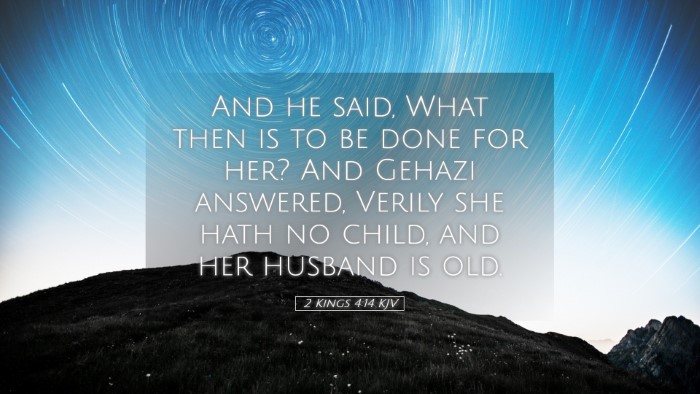Commentary on 2 Kings 4:14
Verse: "And he said, What then is to be done for her? And Gehazi answered, Verily she hath no child, and her husband is old."
Contextual Overview
The passage of 2 Kings 4:14 is pivotal in understanding the ministry of Elisha, the prophet, during a time of great need and desolation in Israel. This verse highlights not only the compassion of Elisha but also the deep-seated societal issues faced by women in ancient Israel, particularly concerning childlessness.
Character Study: Elisha
Elisha, the successor of Elijah, exemplifies a vital characteristic of a prophet — caring for the needs of others. He is depicted as a man equipped with divine insight and compassion. His inquiry concerning the needs of the Shunammite woman reveals a personal investment in the lives of people. Elisha’s role is reminiscent of Christ's ministry, who was moved with compassion towards those in need.
Insights from Public Domain Commentaries
Matthew Henry’s Commentary
Matthew Henry emphasizes the significance of the Shunammite woman's actions, illustrates her hospitality and piety. He notes that hospitality often leads to divine blessings. Henry suggests that the inquiry made by Gehazi illustrates Elisha’s sensitivity to the needs of others and how God often uses people to manifest His kindness. Furthermore, Henry points to the grace in God’s provision through Elisha — despite the woman's social status and her husband’s age, God's capability is not limited by human circumstances.
Albert Barnes’ Notes on the Bible
Albert Barnes highlights the specific mention of the woman’s age and her childlessness, noting that her condition represents a significant social stigma. Barnes conveys that childlessness in ancient societies was often viewed as a curse or a sign of divine displeasure. His commentary suggests that God sees the plight of His people and that Elisha’s prophetic insight allows for the revelation of needs often overlooked by society. He outlines the miracle that will transpire as part of God's overarching plan to honor the faithful and to fulfill promises against seemingly insurmountable odds.
Adam Clarke’s Commentary
Adam Clarke provides a detailed analysis of the cultural implications of barrenness in biblical times. He explains how a woman's worth was greatly tied to her ability to bear children. Clarke points out the tenderness with which the woman is treated despite her lack — highlighting the divine prioritization of spiritual blessings over mere physical ones. He also portrays Elisha as a type of Christ, emphasizing the theme of calling forth life from barrenness, which is a recurrent motif throughout Scripture. Clarke interprets the question posed by Elisha as not only a query into the woman’s life but also a deeper exploration of God’s intended blessings.
Theological Implications
The verse and its surrounding context prompt several significant theological reflections:
- The Recognition of Need: God's providence often begins with the identification of need, as seen in Elisha's inquiry. This willingness to acknowledge and address human struggles points to the compassionate nature of God.
- Faith and Expectation: The Shunammite woman, despite her current state, displays faith and respect towards Elisha. This interaction encourages believers to trust God's promises even when circumstances appear hopeless.
- Divine Provision: The impending miracle emphasizes that God's solutions often defy human understanding. It illustrates the principle that God can bring forth life, hope, and blessing in situations deemed barren or impossible.
- The Role of Community: Elisha’s concern for the Shunammite woman underlines the necessity of community and the church's role in supporting and recognizing the needs of its members.
Application for Today
Understanding the compassionate inquiry of Elisha allows today’s believers to reflect on how they respond to the needs within their communities. Pastors and church leaders can take inspiration from this passage to foster a culture of sensitivity towards others and create environments where needs are openly discussed and addressed. The Shunammite woman exemplifies a life of faith, hospitality, and honor — qualities that contemporary Christians are called to embody.
Conclusion
2 Kings 4:14 serves as a profound reminder of God's attentive care towards His people, encapsulated in the prophetic ministry of Elisha. Through the commentaries of Henry, Barnes, and Clarke, we gain rich insights into the text’s significance, its cultural setting, and its implications for faith today. The promise of God to provide for those who trust Him stands as an enduring truth for Christians, encouraging them to remain steadfast in faith amidst life’s uncertainties.


